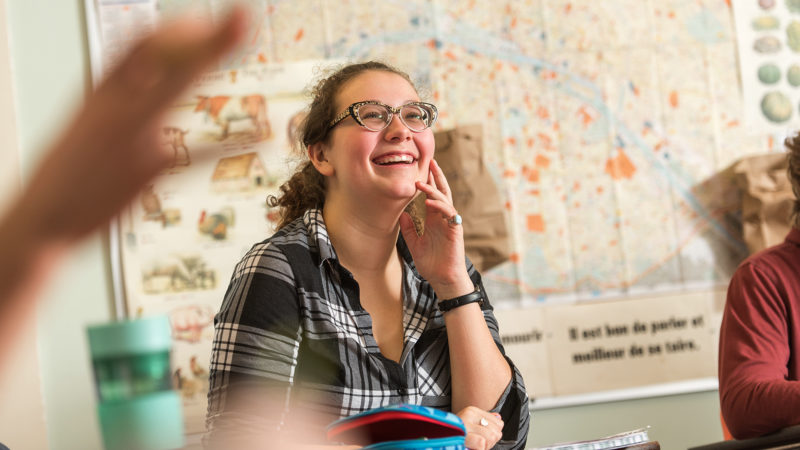Family Rock: On Cell Phones, Security, and Special Places
For each of the past eight years, the ninth grade has gathered at Chewonki’s wilderness outpost on Fourth Debsconeag Lake, just southwest of Baxter Park. In its previous incarnation, the facility was a hunting and fishing camp called Pleasant Point. Pleasant Point Camps became a special place for my family through a series of visits there over a succession of summers and winters. While I was sad when the camp was sold in 2008, thus ending a happy phase of family life, I felt consolation in the assumption that because Chewonki had purchased it, Pleasant Point would come back into my life through Outdoor Experience.
Now when I go on the ninth-grade trips, I tell the students of my connection to the place and then sidle up next to as many as I can on our hikes and ask them to tell me of a special place of their own. The locations vary—from a garage where one student likes to sing to a cabin in the woods built many years ago by grandparents; from a bedroom chair to an memorable spot on a family vacation; from a couch where one student likes to cozy up for long chats with her grandmother to a neighborhood basketball court where another plays as often as he can.
While the locations of their special places vary, there is a consistency in how these places feel. One student captured the feel with his description of a rock that sits in the bend of an isolated stretch of a beautiful river where he and his family like to go to be together, held by nature and each other. They call it Family Rock, a name that to me conjures the aura of connection, safety, stability, and belonging that tends to surface in these descriptions of special places.
Schools, too, can be special places. Waynflete certainly has been one for generations of students. But in the current era when it has become best practice to lock the doors and practice disaster scenarios routinely in order to provide for physical safety, one might ask, why bother being a physical school at all, especially when nearly everything one might ever need to know is available on the internet? Why not stay home and attend school on YouTube?
The answer, quite simply, is that learning is infinitely more powerful in community when that community is, in effect, a family rock—a place of connection, safety, and stability to which the members know that they belong. For a school to be such a place, adults and students alike need to work at creating it.
It is the work of adults to set basic expectations. For example, cell phones, clearly, are an amazing technology that is here to stay and that we want our students to master. Upper School students, therefore, are allowed to have them at school and exercise much discretion in how they use them during the day.
At the same time, we are also well aware of the potential of that technology to become the master. For that reason, we have set boundaries for their use. Students are expected to turn off and put away their phones when they enter their classrooms—our sacred learning spaces—so we can be fully present. As role models for younger students, Upper School students are also expected to turn off and put away their phones when they are in the public spaces in Middle and Lower School buildings.
Beyond that, we will continue to engage our students in conversations about the role of cell phones in creating the kind of community we want to be and make other adjustments to our expectations accordingly. We also invite parents into the conversation through an evening program on Monday, October 22. See the Weekly for details. We hope that you will initiate conversations at home about technology use and be mindful about how and when you are calling or texting your child during the school day.
While much of the work of creating Waynflete as a special place lies with the adults, as I pointed out to students in my opening talk, our success in being that place depends in large part on something that the adults cannot provide or legislate, which is how our students treat each other. Locking doors and practicing disaster scenarios provides for one important kind of safety; habitually treating each other with kindness and respect provides another. I believe an ethic of respect and kindness has been alive and well in the Waynflete student body for years, which is why so many alums think of Waynflete as a special place.
We can’t always predict future behavior based on the past. But from what I have heard and witnessed so far this year, I have a very good feeling about the current generation of students and their investment in forging a family rock from which a vibrant learning community will emerge yet again.



